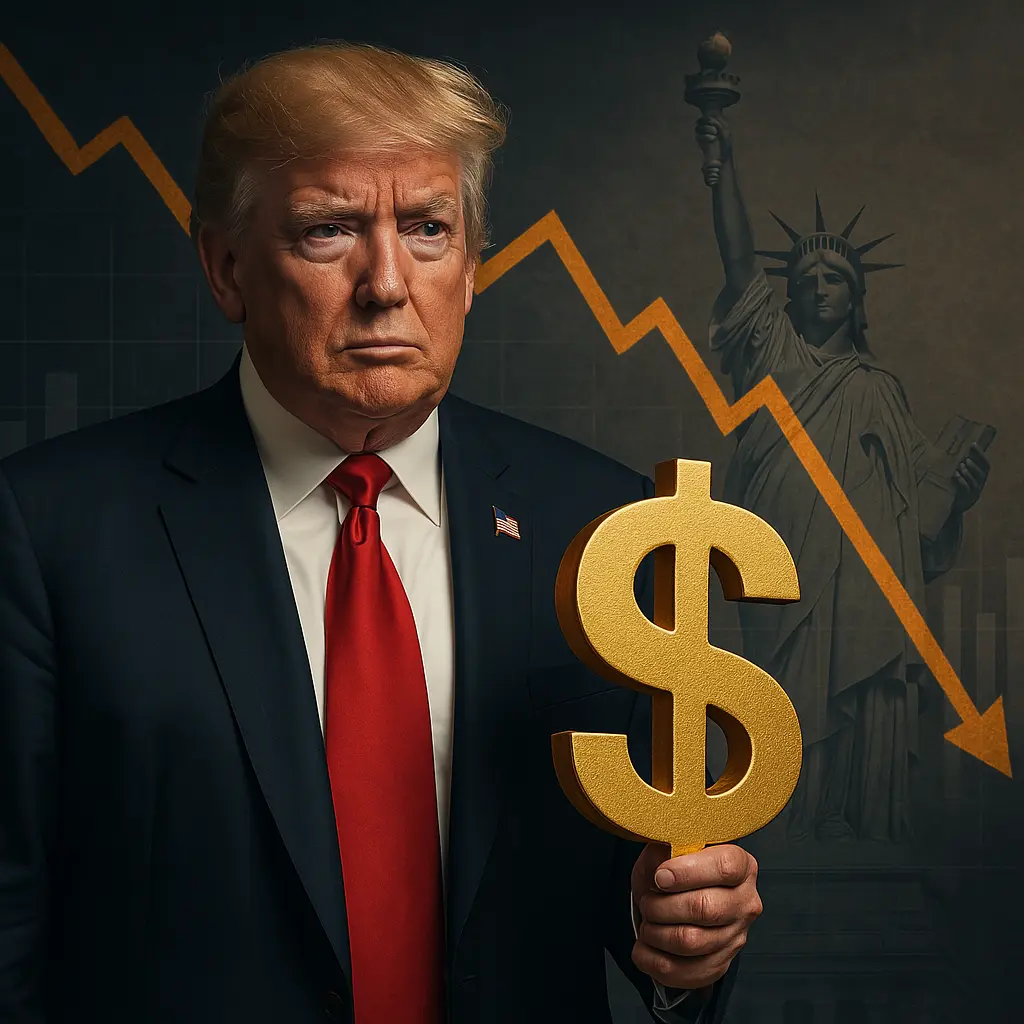Introduction: The Silent War That Could Change Everything
When we think of war, images of tanks, sanctions, and high-stakes diplomacy come to mind. But what if the biggest battle being waged isn’t against a foreign nation—but against the U.S. Dollar itself?
Former President Donald Trump has launched an unprecedented economic campaign that could weaken the dollar, disrupt global trade, and reshape financial markets worldwide. From skyrocketing tariffs to bizarre trade policies (yes, even affecting penguin-inhabited islands), his strategy is causing shockwaves from Wall Street to New Delhi.
Why would a leader intentionally undermine the world’s most dominant currency? And what does this mean for your finances, investments, and future?
Let’s break it down.
Why Is Trump Waging War on the U.S. Dollar?
The Overvalued Dollar Problem
Trump’s core argument is simple: a strong dollar makes American manufacturing uncompetitive.
Here’s why:
- Labor costs in the U.S. are high (22/hourvs.22/hourvs.2/day in some Asian countries).
- A strong dollar means foreign goods are cheaper, while U.S. exports are more expensive.
- Companies like Apple and Nike outsource production to China, Vietnam, and India to cut costs.
Trump’s solution? Slap massive tariffs to force companies to bring jobs back to America.

The Tariff Tactic: Short-Term Gain, Long-Term Pain?
Trump’s aggressive tariffs (up to 54% on Chinese goods) aim to:
✅ Protect U.S. industries
✅ Encourage domestic manufacturing
✅ Weaken the dollar to boost exports
But the side effects are brutal:
❌ Inflation spikes (iPhones now cost $2,000 in the U.S.)
❌ Retaliatory tariffs from other nations
❌ Market instability (S&P 500 dropped 4.8% in a single day)
The Global Fallout: Who Wins and Who Loses?
1. China: The Primary Target
- Tariffs force supply chain shifts (some production moves to India, Vietnam, Mexico).
- China retaliates with its own trade barriers.
- Long-term risk: A full-blown U.S.-China trade war could cripple global growth.
2. India: A Neutral Player (For Now)
- Not yet hit with extreme tariffs, but uncertainty looms.
- Opportunity: If China becomes too expensive, India could attract more manufacturing.
- Threat: If Trump expands tariffs, Indian exports could suffer.
3. Europe & Allies: Collateral Damage
- Even friendly nations like Australia face tariffs.
- Confusion reigns—why tax allies when the goal is to counter China?
The Contrarian View: Is Trump’s Strategy Brilliant or Reckless?
Historical Precedents: When Tariffs Worked (and Failed)
- 🇬🇧 Britain’s Calico Act (1721): 75% tariffs on Indian textiles helped British mills but stifled trade.
- 🇺🇸 Smoot-Hawley Tariff (1930): Deepened the Great Depression by sparking global retaliation.
Trump’s High-Stakes Gamble
He’s betting that:
🔹 Short-term pain (higher consumer prices) will lead to long-term gain (U.S. manufacturing revival).
🔹 Other nations will bend to avoid losing access to the U.S. consumer market.
But will it work?
- China won’t back down.
- Supply chains will reroute, not necessarily return to the U.S.
- Consumers pay the price via inflation.
What This Means for You: How to Protect (and Profit From) the Chaos
1. For Investors
- Diversify globally—don’t rely solely on U.S. markets.
- Watch forex trends—a weaker dollar could impact international investments.
- Commodities like gold may rise as a hedge against instability.
2. For Professionals & Entrepreneurs
- Tech & IT are safer bets (software isn’t tariffed like physical goods).
- Upskill in AI, data science, and machine learning—future-proof careers.
- Consider local opportunities—if global trade falters, domestic markets may thrive.
3. For Everyday Consumers
- Expect higher prices on imported goods (electronics, clothing, cars).
- Buy American-made products where possible—they may become more competitive.
Conclusion: The American Dream Is Changing—What’s Your Next Move?
The era of unstoppable U.S. economic dominance may be fading. With rising tariffs, inflation, and global uncertainty, the old playbook no longer applies.
So, what should you do?
- If you’re considering moving abroad, go for experience, not just financial gain.
- If you’re building a career, invest in skills that transcend borders (tech, finance, AI).
- If you’re an entrepreneur, explore emerging markets like India where growth is accelerating.
Final Thought: Bet on Yourself
Geopolitics is unpredictable. The dollar may rise or fall, but your skills, adaptability, and vision will always be your greatest assets.
🚀 Ready to future-proof your career? Explore high-demand skills in tech, finance, and AI today—because in a shifting global economy, the best investment is you.